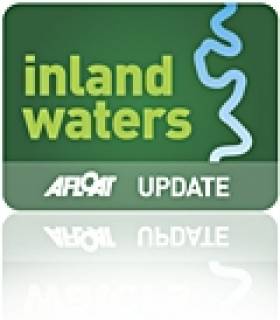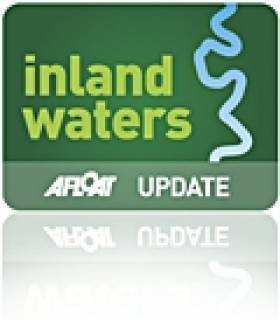Displaying items by tag: 72M
Clodiagh Expedition Leads to New Industrial Heritage Find
Four boats of the Heritage Boat Association, including Heritage Barges 68M and 72M, navigated the Clodiagh to Portlaw recently, the first time that barges have moored at the old Quay in 75 years.
They discovered the Portlaw Graving Docks at the Quay and based on the information in some of the historical documents at the Heritage Centre, these may date from as early as the 1820s and been built before the town. On the same site are the remains of a stone workshop and behind the cut stone quay, they found an old cobbled yard and track.
These structures are close to the old Lock Gate, whose design is reputed to be unique in the British Isles. The gate formed the entrance to the Portlaw Canal where raw materials were carried by barge into the Cotton Mill and the finished product was sent from here on the first stage of the journey to countries all over the world.
All concerned were excited about finding these structures which may pre-date the building of the town of Portlaw. Gerry Burke of the Heritage Boat Association stated "Finds like these are not only important to our boating heritage but give us insights into the social aspects of our ancestors and their amazing skills in creating innovative industrial artefacts by hand. It is important they are preserved for both their tourism value and for future generations to appreciate."
Brian Goggin, who writes about Irish Waterways' history, said "Portlaw's foundation as an industrial town is intimately linked with the use of the River Clodiagh, but there is little published information about the navigation or about how boats used it. These new discoveries add an extra dimension to our understanding and extend the boundaries of the area that should be conserved."
The Heritage Boat Association's aspiration is to protect, promote and celebrate the floating heritage on the inland waterways of Ireland. Our floating heritage provides us with a direct link to the past and includes both commercial and pleasure craft that plied the inland waterways.
Celebrating the Three Sisters Navigation
This year we celebrate the 220th anniversary of the opening of the Barrow Navigation. This linked the Grand Canal with the rivers Barrow, Nore and Suir, and opened up a large area of the hinterland to the great ports of Dublin and Waterford. When the canals closed to commercial traffic in the 1960s it was feared that all use of the navigation would soon cease. Indeed, non-commercial traffic did become very light, but now, following excellent remedial works by Waterways Ireland we welcome a new era for this navigation, one which will bring new life and vitality to the waterway in the towns and villages along the system.
A hundred years ago, 1,200 boatmen were engaged in the business of transporting cargo, connecting people in inland towns with those in Irish ports, and in turn linking them with the great sea ports of the world. Today, many of their descendants live along our inland navigations.
Three of these great canal boats, numbers 72M, 68M and 107B, escorted by a flotilla of other HBA boats will, over the next few months, travel the entirety of the Navigation including Carlow, Waterford, Carrick on Suir, Inistioge and all points in between. The crews are anxious to meet with those whose families had connections with the commercial trade along the waterway, and perhaps even re-unite some long retired boatmen with their old boat.
The following are the expected arrival dates in various locations over the next few weeks:
° Carlow April 9th from 14.00
° Leighlinbridge April 16th from 14.00
° Bagenalstown April 24th from 13.00

























































